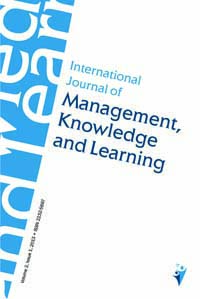Knowledge Sharing Strategies between Coffee Farmers and Coffee Research Institute: A Case Study of Gitwe Farmers’ Co-Operative Society
Knowledge Sharing Strategies between Coffee Farmers and Coffee Research Institute: A Case Study of Gitwe Farmers’ Co-Operative Society
Author(s): Elizabeth Kabita, Tom Kwanya, Tabitha Mbenge-NdikuSubject(s): National Economy, Business Economy / Management, Agriculture
Published by: Mednarodna fakulteta za družbene in poslovne študije
Keywords: Knowledge sharing; knowledge management; coffee research; coffee farmers; Gitwe; Kenya;
Summary/Abstract: Purpose: This paper assesses the knowledge sharing strategies used by members of Gitwe Farmers’ Cooperative Society and Coffee Research Institute in Kenya. The specific objectives of the study were to: establish the types of knowledge shared; examine the knowledge sharing methods; investigate the extent to which the knowledge shared is applied; analyse the factors that influence knowledge sharing between the farmers and the research institute; and to suggest measures to enhance knowledge sharing between them. Study design/methodology/approach: Knowledge sharing involves the exchange of knowledge in the form of expertise or skills among groups, friends, families, communities or organisations. The population of the study was 2181 consisting of coffee farmers, officials of Gitwe Farmers’ Co-operative Society and officers from the Coffee Research Institute. The study employed a mixed methods research approach. Qualitative data was collected through interviews while quantitative data was collected using questionnaires. Qualitative data was analysed thematically while quantitative data was analysed by descriptive statistics using Statistical Package for Social Studies (SPSS). Findings: The findings have demonstrated that the farmers and the institute currently share knowledge through a mixed array of methods. However, several challenges hinder the effective use of these knowledge sharing strategies. It was also observed that currently, the symmetry of knowledge flow is lopsided since the Coffee Research Institute shares much more than it receives from the farmers. These challenges should be addressed if the farmers are to benefit optimally from the knowledge generated by the Coffee Research Institute. Originality/value: The findings of this study if adopted are likely to improve the coffee farming methods by the farmers, improve coffee marketing strategies by the farmers and also manage coffee berry diseases, among others.
Journal: International Journal of Management, Knowledge and Learning
- Issue Year: 10/2021
- Issue No: 1
- Page Range: 157-175
- Page Count: 19
- Language: English

